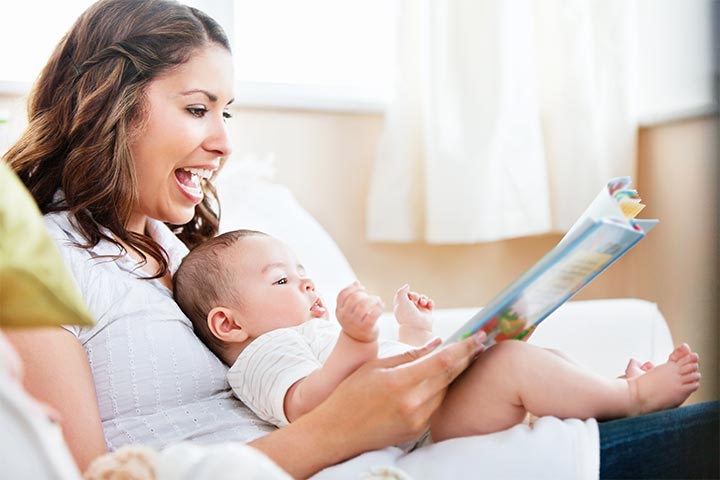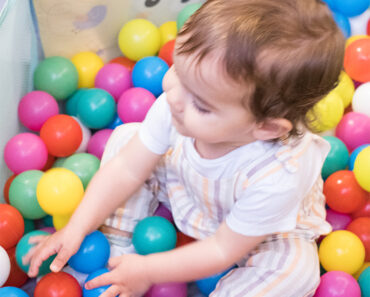Shutterstock
Reading to a baby is an excellent way to introduce the little one language. Although infants may not understand the words, they may still listen and recognize the sounds of words. Regular reading to a baby could lay the foundation for subsequent language, vocabulary, and communication skills.
Parents can read the right books at the right age to ensure that the baby gets the most out of the activity. In this post, we tell you about the benefits of reading to babies and what to read to a baby at different ages.
When To Start Reading To A Baby?
You may read to a baby as young as two months old (1). If you sense your baby does not pay much attention to reading, you may wait until they are four months old (2). Most four-month-olds may respond to parents reading playfully from a children’s book. The more words and language your baby hears, the more it will benefit them in the long run.
Benefits Of Reading To Babies
Regular reading to a baby may benefit the following qualities and aspects of their growth and development.
- Language and vocabulary skills: According to experts, babies who listen to at least five books a day will hear about 1.4 million more words than other babies by kindergarten (3). Even reading one book a day could introduce the baby to a significant number of words and sounds. Babies are believed to rehearse sounds of words in their minds even before they utter their first words. Thus, a baby who has been exposed to language early could have an easier time pronouncing words, learning their meanings, and using them in sentences for communication.
- Parent-baby bonding: Sitting with your baby for some reading time is a great way to bond with them. It is a moment when your entire attention is focused on the baby. The baby is free from other distractions and has their undivided attention to what you are saying. This nurtures the parent-baby bond, strengthening the relationship in the long run (4).
- Emotional development: Babies pay close attention to your expressions and enunciations when you read to them. It may make them better at understanding the tones of voices and the underlying emotions behind them.
- Social and cognitive development: Reading with parents, siblings, or peers could positively affect the baby’s social development skills (5). The baby will also attempt to repeat the words you make, point and name pictures in a book, and copy sounds. These improve cognitive development, affecting other developmental milestones of the baby’s life (6). Listening to new words frequently could also improve a baby’s memory and recall.
- Preparation for school: Regular reading to a baby could improve their phonemic awareness, which is the ability to listen, identity, and recreate sounds of specific words (7). This skill, combined with potentially better vocabulary, may make it easier for the baby to understand language and other concepts once they start school.
Reading To Your Baby At Different Ages
Reading the right books at different ages could help you get the most out of the reading to a baby. Here is what you may read to your baby at different ages and stages of their development (2) (6).
1. Two to six months
Chunky books, soft fabric books, and vinyl bath books are great for babies at this age. Although your baby may seem too young to understand what you are reading, what matters at this age is your company and dedicated attention to them.
Babies in this age group often express their feelings by smiling, cooing, kicking, and laughing (1). Your baby may react using these emotions when you read to them. It is normal for babies to want to hold the book or chew on them. If you feel that your baby is looking elsewhere or seems to lose patience after some time, it may be a good idea to take a break or read to them the next day.
2. Six to twelve months
It is recommended you read books with large, colorful, and attractive illustrations. Since babies in this age group hold and grasp everything in sight, board books are ideal for them.
Your baby may enjoy exploring the books by themselves — touching them, opening and closing them, turning the pages, and looking at the images. Repeated, regular reading of books could enable your baby to pick out their favorite book. The little one may also begin to recognize stories and illustrations of specific characters. Some infants may also begin to recognize the sounds of specific words.
What To Read To Babies?
The best baby books for children under one year usually have the following features (7).
- Attractive and simple images
- Bright colors
- Illustrations of shapes and animals
- Large letters in an attractive font
- Repetitive pictures
- Illustrations of familiar objects, such as toys
- Easy-to-turn pages with different textures
Younger babies are more likely to be enticed to your voice and its rhythm than the book itself. Therefore, you may pick books with rhymes, short poems, or songs that have a rhythm to them.
Tips To Make Reading Fun And Effective
You may make reading a fun and useful experience for your baby through the following ways (4) (8).
- Make reading a routine: Pick a time each day and read with the baby. It will establish a routine. It is okay if the baby does not seem interested initially. The reading session could be a few minutes long but should be observed daily.
- Choose the right books: Pick books that are relevant for the baby’s age. For instance, you could pick books with more emphasis on the story for older babies. Choose books that focus on illustrations and rhyming words or sentences for babies who are introduced to reading.
- Read with emotion: Modulate your voice and enunciate words wherever possible to stress the associated emotions or sound-related attributes of a word. Young infants are more likely to focus on words and their sounds rather than the book itself. Reading with emotion could help indicate that book-reading is a meaningful activity, just like playing with toys or strolling.
- Allow your baby to lead: Do not stop the baby if they interrupt you to babble and repeat the sound you made. Encourage them to repeat it with you. Older babies could be asked simple questions related to the words they hear. It is a great way to stimulate their thinking process, helping their overall cognitive development.
- Maintain variety: Read different books to sustain the baby’s interest. Several libraries and local community groups let you borrow books for babies. You may also consider a subscription service where you could receive new books each week or month. Maintaining a variety of books could prevent making reading monotonous.
Reading is one of the best habits that can be encouraged in children from a young age. Reading to babies is beneficial for their cognitive, social, and language development. Finding the right book for your baby and creating a library of baby books is the best way to reap the most out of the activity.


































